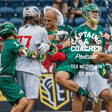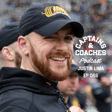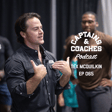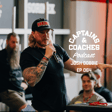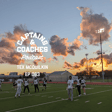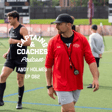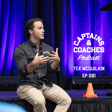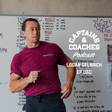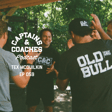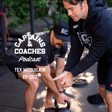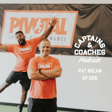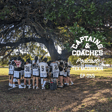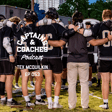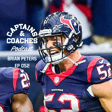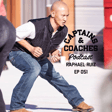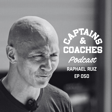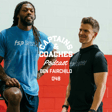The Essence of Authentic Coaching
00:00:00
Speaker
Consistency builds trust. So I think when you come in and start working with a guy, like you have to be your true authentic self because these guys are pros. You know, you can't like be the hype person if you're not. You can't be like the detail oriented guy like if you're not. So I think when you're coming in you have to be very true with like what's your why. And it's always been ah get comfortable being uncomfortable.
00:00:22
Speaker
you know I know I have this hat here, but struggle well. like If you're not um struggling, then you're you're not pushing yourself outside of your comfort zone.
Meet Coach Stephanie Mock-Grubbs: A Trailblazer
00:00:31
Speaker
Welcome to the Captains & Coaches podcast. We explore the art and the science of leadership through the lens of athletics and beyond.
00:00:38
Speaker
I'm your host, Texel Kulkin, and today we're traveling to my hometown to sit down with Coach Stephanie Mock-Grubbs, the groundbreaking first female coach in Houston Astros history, and a visionary who understands that true strength is built from the inside out.
00:00:52
Speaker
Her guiding philosophy, get comfortable being uncomfortable. Coach Grubbs has crafted her arsenal across sports from college volleyball to the Pittsburgh Steelers and now the show, proving that the weight room is actually a laboratory for life.
00:01:08
Speaker
You're about to discover how she uses daily wellness check-ins to unlock emotional intelligence in elite athletes, how she reframed stress as challenge rather than a threat, and the exact strategies she uses to help athletes navigate massive life
Adaptability: Coaching's Ultimate Superpower
00:01:23
Speaker
transitions. And finally,
00:01:24
Speaker
We'll discuss why she believes adaptability is the ultimate superpower. With that, let's hand it off to Coach Grubbs to help us raise the game. Coming to you from H-Town. Yes! Clutch City.
00:01:37
Speaker
Yes! Coach Stephanie Mock Grubbs. are we doing? I'm doing great. I'm super excited to be here. I am so excited. So grateful. Been a longtime Astros fan. And now I get the opportunity to connect with one of their strength coaches. Oh my gosh, yeah. Houston's hot and we're loving it. So luckily our stadium has a roof to stay cool. so Oh yeah. I mean, now named the Icebox used to be the juice box.
00:02:01
Speaker
I know. Yeah, Dykin Park. We're doing it. Yeah. Loving it. So what's your first take on H-Town? What's your favorite Mexican food joint so far? Oh, my gosh. The diversity in the city. because I've been to Austin, too, where you're at. um But the diversity of food here is crazy. But ah my favorite spot is Traveler's Table. It actually features food from all over the world um on the menu. So it has a little bit of everything. So it covers all the bases. But yeah, I've been trying to dabble in different food groups. Yeah. Yeah. Wow. I have not been there.
00:02:33
Speaker
That's a spot you need to go to then. i will put it on the list. Yeah, I used to, living on the East Coast for years, explain Texas. How I would sum it up is you live in Houston, you party in San Antonio, you visit Austin for all the experiences, and then F Dallas.
00:02:50
Speaker
So that's my summary. No, we went to play the Rangers. I was like, wow, Dallas is also... huge so and they're in their stadiums pretty new in these as well so it it's been fun yeah it's almost like they just copied the old enron minimade dyken park and just made it now dallas yeah just stole all the good parts Oh my gosh. yeah no so Seeing all the parks has been an adventure. And all the visiting weight rooms. It's it's been nice to kind of have that asset every time we go to a new park, having a visiting weight room, all the equipment that we need to train the guys and kind of hunker down and make it our home for a few days every time play a series. What's been your favorite park so far?
00:03:28
Speaker
Oh, my gosh. I mean, the Rangers facility, since it's so new, um the visiting weight room is very nice. But I'm excited to go to the Red Sox. We'll play all right at the Red Sox and at the Yankees. So just seeing baseball history as we go to each park has been super unique and just learning more about all the greats that have come through every stadium and just kind of seeing different weather and just looking at travel and trying to help the guys as best as we can.
Path from Athlete to Coach
00:03:53
Speaker
Yeah, that's that's pretty amazing. I mean, history is there. My my favorite iss Baltimore, by far, just a beautiful place and just all the brick. Yeah, reminds me a lot of, ah i mean, just baseball history walking around downtown.
00:04:07
Speaker
Definitely, definitely. Well, speaking in history, it took a a long journey for you to get here, and it it started with collegiate athletics. And then I've been fortunate to listen to a lot of the interviews and interview in previous opportunities.
00:04:22
Speaker
And just the start within volleyball that presented this, oh, I need to find a solution to catch up to competition. And that was training and lifting. So introduce us to your entry-level leadership within college athletics that then sparked this entire journey and career that you've built.
00:04:42
Speaker
Yeah, no, I got really lucky to have great college strength coaches when I started playing at West Virginia University. So a few gents, Mike Joseph, Darrell Bauer, Corey Twine, Kevin McAdams actually here in Houston right now and same with Corey Twine. But luckily I had great strength coaches that got me to understand training when I was an athlete personally and created buy-in. And um if I stand up, I'm only five foot three. So playing college volleyball at WVU, I had to maximize ah Clearly the weight room, but the mental performance space, nutrition, i think it allowed me as a player to see how important the performance team is um just through my own training. And then once I got done, um my parents always told me to just do something that you love as a job and a career so doesn't feel like a job. And I was like, man,
00:05:28
Speaker
I love being in the weight room. i love training. I saw how it really influenced my time playing in college sports. So I wanted to be able to give that back. So I think it's been really cool to be able to do that in the college space. And now kind of I had a short stint with the Steelers, too, in the pro space, just dipping my toe in the water. But now just being in an MLB is really cool.
Embracing Change and Diversity in Coaching
00:05:49
Speaker
believe it. Yeah, the the aspect. And then what I do want to focus on is is transitional opportunities. So those freshmen coming into college for the first time, that volume, and then even this opportunity where you have players from all walks of life coming into the majors for the first time and becoming a professional athlete.
00:06:10
Speaker
So now what is your approach when you're introducing yourself to an athlete for the first time and it's their first time meeting a pro coach? Yeah, yeah. I think i I look at the transition a lot differently now that I've been on both sides because I can think about a lot of the summer education that we did at Clemson, let's say with baseball.
00:06:29
Speaker
We kind of took them through this performance development, like onboarding with the freshmen, talking about. Just like, hey, we want them to have peak performance. You're going to have a lot of resources that are new and advanced in the college space from your high school space.
00:06:44
Speaker
So we take them through this education over the summer of like why we do block zero, ground zero training um from a S&C standpoint. Nutrition, we talk to them about different supplements, really drug testing and and things like that. So they're aware of what that's going to entail.
00:06:58
Speaker
um We did do a lot of education in the summer with the freshmen. And then now I think about like I go back and like, all right, we did that education. But now when they get drafted, like we had a lot of players get drafted from Clemson to Major League Baseball. Like, what does that transition look like? And we tried to do everything we could, like bringing back players that were playing in the pros and talking with some of our teams, whether it's track and field with Brianna Rollins. She won to ah gold medal at the Olympics a few years back. But like, I think.
00:07:24
Speaker
When we have pro athletes come back to the college space and and talk to the young people of what's important, what they need to see. i think that I'm glad we did that when we were at Clemson um and those athletes decided they wanted to give back to the university. But now I'm like, oh, man, the the age range you see in college sports is crazy. you may have an athlete that's like 22 or 23.
00:07:46
Speaker
You have an athlete that's 35, you know, that could be older than you. So I think um the best ability is adaptability as a practitioner and also availability as an athlete, of course. But I think I've really tried to make myself adaptable to I'm not approaching every guy with the same cookie cutter approach because they're all kind of in different spaces throughout their career and development. So yeah.
00:08:09
Speaker
And way different because like in college, you'll see 17 21 or 22 with the fifth year and the transfer portal. But now I'm dealing with the 22 to the 35 or maybe there's guys even in our space that's up to 40 years old. Like yeah you need to meet them where they're at and then continue to develop them and give them a little autonomy in their training.
00:08:29
Speaker
You've had the opportunity as a college coach to move to different teams. And when you're a college coach moving to a different team, You have juniors and seniors that had two, three years with a previous coach.
00:08:40
Speaker
So now you're stepping into the professional space. They've had but ton of coaches, and you're stepping into this program for the first time. What was your approach to then introducing yourself?
00:08:53
Speaker
A lot of coaches, they want to barrel in and say, hey, this is my way. But what was your take now at the the pro level with the
Integrating into MLB with the Astros
00:09:00
Speaker
Astros? Yeah, I think I'm really lucky to have a resource like Wes, our head strength coach, the Astros and his background. He came up in Major League Baseball. He started in like the DR and he's from the DR and kind of worked his way up within the Astros for like and like maybe like 10, 11, 12 years.
00:09:19
Speaker
um So seeing his background and using that as a resource, asking questions, understanding where the guys are coming from, what does that developmental process like look like if you get drafted just straight out of high school?
00:09:29
Speaker
um So using him as a resource and and having him as a mentor has been super helpful for me because he understands the system because he's worked in the system for a long time versus me.
00:09:39
Speaker
I think I bring... a different look on things and may have a better understanding of the guys coming from like the college realm and getting drafted over because I used to be in the college realm. um But not all of your roster in Major League Baseball, like guys are coming from college, you know, that's sometimes if you and bar in between or maybe half or depends on the organization. so I think leaning into um your resources, mentors, your manager, your bench coach, like your pitching coordinator, your hitting coordinator going in. And I think my first like 30, 60, 90 days was a lot of just going in and asking questions and asking the guys like what worked well for you, like what's worked well for you in the past.
00:10:19
Speaker
um And then slowly add some ideas along the way because, yeah, they they have been in this level for a little while, a lot of them. So you want to kind of take time to understand what works for them and,
00:10:30
Speaker
look at injury history and really in baseball, there's a lot of data. So looking at some of the high speed running that hit on Hawkeye on the field, but um just looking at a lot of this information. But I think it's really important as a new person to an organization. I know you want to bring value right away and for sure me too, but just kind of get a really good lay of the land and then bring ideas that you think will be an asset to the organization is probably the the best way. And I have a book The first 90 days that I bought before I got into this role. And I heard about it from ah Adam Pettway.
00:11:01
Speaker
um But first 90 days kind of gave me a good understanding of like, you want to come in and create value. um But also like your first 30 days, it's gonna be a lot of like you asking questions and needing things from people. But when does the bridge of the gap come of all right, now I'm bringing more value than I'm actually like asking for things. So I think just finding finding that um transition can be hard, but yeah, be patient and asking questions.
00:11:26
Speaker
Yeah, I can see you writing a sequel to the book, The First 90 Games. yeah Oh, my gosh. We're not there yet. We're getting close. Yeah, for sure. But yeah, no, it's I I try to gain perspective of like, I think when I started this position in January, um was lucky to come in and work with some of the guys and build relationships then when things weren't like.
00:11:47
Speaker
Too high stress and too high tempo. It was still off season. it was really about like building relationships with some of our guys here in Houston to now going through spring training and now being like, let's say a quarter of the way through the season. i look back and I have to like gain perspective. Like, man, I've come a long way um just in my my baseball setting so far. what What's your approach there? Are you journaling? Are you documenting? you making mental notes? Yeah.
Daily Mindset: Gratitude and Goals
00:12:12
Speaker
ah So every day, usually, ah this was something from Huberman Lab that I got from his podcast. Like, I'll wake up. I'll start with, like, gratitude. um I'll start with threats to my day of maybe why I can't achieve my goals. Then I'll go into, like, part three of, like, what do I want to accomplish this day? um And then just, like, personal goals along the way, too. So, like, professional, personal, um kind of having those, like, power lists, I like to call them, instead of checklists, empowering me to get things done. Mm-hmm.
00:12:40
Speaker
But always just giving gratitude and then recognizing like what what's going to keep me from getting to those goals that I have listed below. so like kind of like threats, like social media and scrolling on my phone, like I could take 90 minutes away from my day.
00:12:54
Speaker
um But then also like one thing I try to do when I'm driving into the city to the stadium is listen to a podcast like this. So I think trying to maximize your time, but do that every morning or even like the night before to to really get the most out of your day and continue to stack days.
00:13:08
Speaker
Yeah, I like that. And then now you you're gaining that experience because there's no doubt that the season is so long. There's highs and lows. There's streaks. There's up and downs. There's team streaks. There's player streaks. And this anchoring and this practice, you now have tools that you can hand off to your guys if they're not feeling gratitude when they're entering in after a little slump.
00:13:29
Speaker
Yeah. Time out. Let's take one minute to talk training. I'm presenting to you the Old Bull Program. This is the program that I am writing for myself, former collegiate athlete, former guinea pig of all sorts of training programs. I've seen and I've done it all and my body is feeling it in order to recover my joints, still continue to build muscle, and look the part as a coach leading the way, I'm offering you Old Bull Programming.
00:13:57
Speaker
This is what I'm following. It is fun. I'm having a great time bringing in former athletes and colleagues into the party. Meet us out there for a seven-day free trial. Click the links in the show notes to give the Old Bull Program run.
00:14:12
Speaker
Now, back to the show. Ready, ready, and ready.
Pregame Preparations for Success
00:14:15
Speaker
Speak to us on the warm-up and the preparation. So this is something I'm excited to see at the game tonight. And then I went to opening day, which just so happens to be on my birthday this year. Let's go. went with my dad. It was great day.
00:14:28
Speaker
And then we got there early, of course, national anthem, and you're just finishing up your warm-up. So was cool to see you in action on the field pregame. Yeah. What is that pregame preparation and warm-up? Is it just with the field guys? Do you do any work with pitchers?
00:14:42
Speaker
What's your experience pregame here? Yeah. One thing I had to learn about professional baseball is just everyone's routine looks different. um So I think we try to look at pitchers as like the starters relievers, of course, and then you have your position players. And that's when you saw me out there working with some of the position players. But Um, truth be told, a lot of the preparation happens behind the scenes. Like that's like the very last, like whatever they need to build confidence before they go to their position.
00:15:10
Speaker
um but yeah, opening day. Oh my gosh. I didn't know until like the day before that all the coaches had to run out onto the field. I thought they were messing with me at first. Like I'll step you to run out of the field opening day. And like,
00:15:22
Speaker
high five everybody on staff and I was like I'm running out of the dugout like me I'm the strength coach but yeah that was one really cool and probably something I'll never forget that's what everyone kind of told me ah it just being my first opening day and and coaching in the in the show everyone calls it so but a lot of the preparation um in Major League Baseball happens on the other side of the dugout behind the scenes so if you go through our dugout you go straight upstairs and clearly that's the clubhouse so the training room the weight room The cages, the locker room, and then like where they eat, of course, um and all the coaches offices. But let's say for like, for example, a seven o'clock game, a lot of the guys may roll up to the facility around noon, have their first meal. um Depending on the position, they'll do a lot of their they might have like two times they do prep work. They may come in and do prep works and mobility.
00:16:12
Speaker
some activation type stuff, some met ball stuff, some band stuff, nothing too heavy in load, um just to prime their body before they go hit in the cage. So some core work, rotational work, whatever it may be.
00:16:22
Speaker
um Then they'll kind of have have another meal, kind of look at who they're facing, study the game a little bit, and then they'll come back in and do another round of prep work um in the weight room. So I think...
00:16:34
Speaker
The weight room is kind of like in the middle of the clubhouse and i like to think of it of course the strength coach is like the heart of the facility because everything else is happening kind of around it the cages the training room and that in the other but yeah a lot of the prep work happens kind of inside the clubhouse Behind the scenes and the one thing I had get used to in Major League Baseball is it's unlike any other sport in a sense of let's say in football you play in the NFL on Sunday like you have all that time to prepare for your opponent um like throughout the week maybe monday's your off day and then you tuesday wednesday thursday friday a saturday to prepare to play against the steelers or whatever it may be um for us like you don't have like you're practicing and preparing the day of the game because you have a game pretty much every day so i think i've just had to adjust to that everyday game day mentality and everyone's going to have their routine that's going to make them feel prepared
00:17:26
Speaker
um But consistency builds trust. And I think some of the best players in the game have like a really good routine set up. And then sometimes they may come to us as a resource of like, hey, my hips are tight. Can you give me a few exercises for that? Or I need to do a better job separating my T-spine and my hips, like shoulder hip separation and and things like that. So I think just being there around the guys, um if they do have a question or need something in particular, like you're right there to help.
00:17:51
Speaker
But I think it's really cool that they're always passing through the weight room to get their prep and what they need, whatever position they may be. And there's a lot of powerful conversations that happen during that time. And that's kind of like your daily check-in how they're feeling, especially as you go through 17-game stretch, 13-game stretch.
00:18:07
Speaker
um traveling coast to coast, you name it, we're doing it. So I think it gives you a great pulse just those like micro conversations along the way. Yeah, I do want to spend some time with those micro conversations.
00:18:19
Speaker
And I mean, that's where you are building trust.
Building Trust through Authenticity
00:18:21
Speaker
And the beauty of a strength coach, you get an opportunity to really connect deeper. So sport coaches are so dialed in perfection, the data, as you mentioned, but then strength coaches, we know the relationship between emotion and performance.
00:18:37
Speaker
And the the weightlifting, the barbell, we get to see it unlocked when they make a mistake, they miss a lift, and then we as coaches can help shape those reactions, especially at the younger level.
00:18:48
Speaker
But now as the professional, a lot of those reactions, those behaviors, they're locked in. So how are you stepping in to now develop a relationship, can connect, and then take these people where they can't take themselves, even at the top level?
00:19:02
Speaker
Yeah. I've always told myself, and even when I was a college athlete, like consistency builds trust. So I think when you come in and start working with a guy, like you have to be your true authentic self because these guys are pros. You know, you can't like be the hype person if you're not. You can't be like the detail oriented guy like if you're not. So I think...
00:19:22
Speaker
When you're coming in you have to be very true with like what's your why. and and luckily, I'm grateful that I've been coaching for a long time and I've been able to kind of develop my own personal ah coaching philosophy and my why and my perspective of who I am. So I think I'm grateful that I've had a few years in the game and this isn't like my second job because that'd be pretty tough.
00:19:42
Speaker
Um, but I think being true to what's my why and it's always been ah get comfortable, be uncomfortable, you know, and I have this hat here, but struggle well, like if you're not, um, struggling, then you're, you're not pushing yourself outside of your comfort zone. So I think, uh,
00:19:58
Speaker
I've always throughout my career tried to take um strategic steps in regards to challenging myself from one position to the next. So I think um I like to also cook call it a calculated risks throughout your career, like no position. And I have so many interns that call me for advice on like jobs and things like that. They'll call me and be like, all right, like.
00:20:19
Speaker
I'm thinking about taking this position and I'm always coming from a very unbiased place. I'll just start to ask them questions and I'm like, Hey, you got to like lay out pros and cons personally and professionally that role. And it's not always like, it's not ever going to be like this next position all only has pros and zero cons. Right. So I think calculated risks have been really powerful if i as I've kind of like grown throughout my career, but yeah, just figuring out what's your, why, like, why'd you get into coaching?
00:20:45
Speaker
Why are you here to to help the team? Like, what can you bring to the table? And every coach within the organization should be bringing some type of value. So like, what value can I bring to the team from my prior experiences being at in the university level, being in the NFL? um But you just want to help the team win. You have to just keep that
Adding Value: Authenticity and Risk-taking
00:21:03
Speaker
always in mind. It's not about me.
00:21:04
Speaker
It's about the team. you know certainly And it's about the players. so And you want to keep them healthy and like what can I do for these guys? Be consistent. Be my true authentic self. And just bring value at the end of the day.
00:21:17
Speaker
And i mean finding the true authentic self, it takes reps. And why i like the captain position, why I like college athletics, is because you are taking a lot of risks.
00:21:28
Speaker
Public speaking, calling out teammates for Below the line behaviors. So there's a lot of leadership within that. Taking us back to your your college career.
00:21:39
Speaker
Like when did you really just buy in for yourself the get comfortable being uncomfortable and stepping up as as a leader? Yeah, I think whenever I was playing at West Virginia, I got recruited by one coach to come in and play. um and then there was a head coaching change. My first head coach retired, new head coach came in.
00:21:57
Speaker
and um I had a lot of teammates like transfer to different schools because they were like, oh, this is the unknown. And for me, I was kind of later in my career going to my junior year. And I'm like, well, I thought about transferring, right, that pros and cons of like if I transfer, what will happen with that versus if I stay and kind of see this new leader through.
00:22:15
Speaker
um and i was super grateful that I stayed and got to know that head coach and what that head coach valued. And it was interesting because how she recruited, maybe I wasn't the typical like recruit for her. So I think as I look back,
00:22:29
Speaker
She made me better. i had two head coaches at one place that I could learn from and grow from. But I could also look at that from like a glass half empty mindset of like, oh, I'm not like the like the the normal recruit that you would bring in, like super tall, like in every single position, well-rounded player. I was very like defensive specialist minded. And yeah, I was short. So I think not like writing myself off from a a player DNA standpoint of what her recruit was. i took the time to try to like do everything i I could on the court to develop myself, be as fit as possible, strong, not get injured. You know, like what am i doing to keep myself on the court playing and be an asset to her? And I think that's where I learned, like, you just need to bring value as a player or like a person on the performance team to help the team win. So I've always lived by two. Another, like, I think part two of what's my why is staying curious.
00:23:18
Speaker
So I'm always, no matter if I'm like first year in strength and conditioning or year in strength conditioning, I'm always continuing to like ask myself questions.
The Curiosity-Driven Coach
00:23:28
Speaker
Am I the best in this area? What can I learn more um from a programming standpoint, staying curious? like Am I doing the same program that I did with baseball at Clemson in 2016 with my MLB athletes? No. So I think just staying curious along the way and asking good questions and having good conversations with great people like this. um But I'm It's been interesting as I've kind of made a transition and a pro sports, just kind of like my circle of people that I'm talking with has slowly like evolved and changed. And not just because like I only want to talk to pro sports people, but as I'm traveling, there's a lot of great private facilities in some of these cities that you can stop by and visit and and chop it up with them. so
00:24:07
Speaker
I think always trying to learn from like anybody, private sector, pro sector, college sports. um Maybe they just wrote a book and maybe they're a PT you know or a doctor. So staying curious, asking questions no matter. And you never know everything like by any means. so I'm just always just trying to constantly evolve myself from the best version for the team.
00:24:28
Speaker
Yeah, that that is a great approach. And I mean, even if you are stuck in an elevator or sitting next to a stranger on a plane, if you are curious, there is so much you can learn from this person.
00:24:40
Speaker
And then it usually unlocks a ah connection or relationship or something in there. So I highly value that. And within respect to where you had two head coaches, like we're,
00:24:53
Speaker
Were you a team captain? Were you allowed the opportunity to lead that group? Or were you that defensive specialist who's, I'm going to lead by example and do everything that's asked of me and more. because that's just naturally who you are. Did you get an opportunity to vocally lead too?
00:25:07
Speaker
Yeah, I would say my my transition of my like just personality in general, it's funny, I was telling one of our guys this the other day when I saw, or one of the other coaches, um his son was like super shy. Like I went to introduce myself and he like went and and I was like, oh man. And he was like, no, he's just really shy. And I was like, funny story. Like when I was young from until like really the sixth grade, I was extremely shy.
00:25:32
Speaker
So I was like always hiding behind my parents, and this, that and the other. And then when I started playing sports is when I started to get more extroverted. um But when I tell people that I used to be shy, they're like, what? That's crazy.
00:25:45
Speaker
So I think sports allowed me to kind of like open the door, get a bigger personality. and And then once I got to college, like I was never the five-star recruit. I came from like a high school in Western Pennsylvania where like I was the first D1 athlete to come out of that high school. It wasn't like some powerhouse pumping out people. No volleyball. Volleyball, particularly any sport.
00:26:06
Speaker
but um So I think for me, that was that was really cool. But also, yeah, I was like the two-and-a-half-star trying to develop to the five-star. Yeah. I tried to lead in the weight room was kind of like my my niche, I would say, but still powerful. And then lead when I when i got on the court, lead in that way. I was a defensive specialist, libero, whatever was called upon me in that regard.
00:26:29
Speaker
Yeah, that's awesome. A few things on that. Number one, starting with kiddo. So now there's something called earshot, just earshot praise. So I'm going to highlight the word praise.
00:26:41
Speaker
But right now he's hearing earshot that his dad is telling – a counterpart, a team member, a stranger, that they're shy. So now the kid, he's telling himself he is shy.
00:26:53
Speaker
So it it it can be reframed as, oh, he just he needs to get to know you before he warms up to you. oh So now he's not labeling himself shy. He's just saying, okay, it takes me some time to warm up to people, but I can warm up to them.
00:27:08
Speaker
So now understanding that with earshot praise, this is what I, I got five sisters. So they did a lot of talking for me. So I was shy. where are you throughout all the sisters? Four older, one younger. Oh my gosh. Love that. oh ah Someone does. So then, ah but the earshot praise now, if I'm talking to a stranger or if my sister is saying my nephew's shy, now you have an authority figure and it's like, oh, he hasn't warmed up yet. Or if I tell the stranger, hey, he's really fast or he's a great he's great receiver, he's a great at art, he's great at drawing.
00:27:44
Speaker
I'm not telling him he's great at drawing. Because then maybe it's in one year out the other. It probably weighs more than I'm like a a loved one versus like mom and dad because you just brush that stuff off more often than not.
00:27:56
Speaker
But if I tell, if if I introduce you to my nephews and I'm like, oh, he's an amazing artist, then he just tells himself he's an amazing artist and it just has this weight.
00:28:07
Speaker
So it's earshot praise. So I'd even try for professional athletes in the locker room, if you learn something cool about them, that maybe another coach or a team member hasn't had the opportunity to learn.
00:28:19
Speaker
And they'll be like, oh, Stephanie, remember that she's really invested. But with kids especially, it's it's this little thing that has so much more weight. And then on the reverse, this is what I refer to as coaching scars.
00:28:32
Speaker
So now if if we're in the film room or ah we're out there and coach says, like, McQuilkin can't tackle, they they can't do this, or they're not a
Fostering Coach-Captain Relationships
00:28:43
Speaker
or they they always do this. And they're not telling me directly, but now I take that on as a label. So those are a lot of the conversations that I'm battling, but it definitely starts with kids. And then Shy is one of the ones, because you know, and you know how it felt, because it takes a lot to then step up and lead. I was very fortunate for ah sophomore captain, junior, senior. I had three years to step into from leading by example into oh, I have to say something. And finally, like, oh, I'm um the vocal and the example leader of this team. So the the evolution, this captain-coach relationship that i I value so much, I see it in you as well.
00:29:26
Speaker
So it's cool to hear that. But then next time you talk to dad, be like, hey, i mean let me introduce you something. And it's called the earshot praise. It's very cool. Yeah. No, i I have a couple thoughts on that for sure of,
00:29:40
Speaker
I even think back to what my mom used to tell me, like, oh, Stephanie's shy. and it's like, yeah, it's making me, it's reinforcing that, oh, I am shy. But ah even when I'm learning a new skill or even like for me personally, pull-ups have always been hard.
00:29:54
Speaker
um So when I was in college, I was like, hi I really stink at pull-ups, da-da-da-da, like writing myself off. And now I've transitioned working with um a really good mental performance coach, Bernie Holiday. He works with the Pirates and he helped at Pitt with...
00:30:07
Speaker
volleyball It's like, I'm not good at pull-ups yet. I'm not great at pull-ups yet. So keeping that window of opportunity and growth mindset of, if you're not good at a skill, just say, hey, I'm not good at push-ups yet. I'm not good at pull-ups yet. Like, I don't understand this concept yet. um So just reinforcing that. And then also we'd always watch film, let's say, and it's like, hey, and I didn't get to the position on the field that I needed to, let's say with volleyball.
00:30:34
Speaker
um And it's like it's showing me that and it's like, hey, I'll be better. Happy to be here. Like just kind of reinstating right like, hey, and need be better at the skill, but I'm still I'm happy to be here. You know, and I want to be a part of the team and and it's a great asset as well. So I think to your ears of praise, like those are kind of two areas that I try to they get and the I'll be better happy to be here. peace And if you're a team captain here, athletes get down themselves. Usually it's instinctive to to pull them up.
00:31:02
Speaker
And um I'm curious in your career, whether it's athletic or just getting started to coaching from the college or the pros, How are you stepping in to shape words? Have you seen anybody really make a a mental behavior change from you stepping in and trying to shape how they speak about themselves or their performance?
00:31:21
Speaker
Yeah, I think one thing that I've tried to do well, and I kind of learned this when I was in college at Pitt working with a a pretty advanced team, was my coaching, depending on where we're at with the game day, including baseball, it's tough because we're playing every day MLB. But if we had played Friday, Sunday, my coaching and criticism, let's say like the furthest day out from game day, I'm like, hey, guys, I'm going to coach you really hard. going to tell you where you need to grow.
00:31:49
Speaker
um You have that ability because it's far out from game day to kind of break them down and build them back up. As we got closer to game day, I tried to change my language to be more uplifting because I already know they have the stress of like the game is coming up, this, that and the other. So trying to structure the week of giving a lot of feedback for the stay out from game day and kind of every day that we got closer, being more empowering, uplifting, positive.
00:32:12
Speaker
um with the lifts and the language, just because I know, especially in season, you have a lot of stress with like watching film, preparing for the game, getting kind of broken down of like what you need to improve on the court.
00:32:23
Speaker
So how can I change my language for the stay out to getting closer along with the workload, right? um And what you're working on intent wise in the weight room. But yeah, I tried to formulate my language of like, hey, today, guys, like, do you want me to get on you? And then the kind of opening that door to ask them that question, they'll be like yeah, i want you to give me feedback.
00:32:40
Speaker
all right, great. Hey, this is gonna be the day that like I'm really going to break down your technique and give you a lot of feedback in that regard. And maybe that's more on the technical aspect versus the emotional aspect. I'm supporting them more as we get closer to game day. It's kind of been something that I like organically have done over time, just coaching for a while.
00:32:57
Speaker
I like that. So that that's in line with your adaptability. And then I think we just coined a new term, the word load. So there's workload. Now we're on word load. I'm tempering how I'm communicating to then prepare them and then lead them to game day.
00:33:14
Speaker
Yeah, that's that's a great way of quoting it. So I appreciate you organizing my thoughts into load versus workload. Yeah, there we go. get Closer to game day. Let's go. And there's also calculated risk in that because you may be on this track within where you're leading and building them up, but then life outside, they're somewhere else.
00:33:35
Speaker
So now you need to, okay, even though I'm on this track, I got to make a verbal adjustment to get their mind right because we do got a game coming up. Yeah. yeah No, I think um your impact as a strength coach or even like a sports scientist, say have I've kind of like dabbled in both.
00:33:51
Speaker
um It has more impact than you realize a lot of the time. And just you're around the team a lot. so you always want to be able to enhance their performance from an emotional standpoint and a technical standpoint of of giving feedback. So, yeah.
00:34:08
Speaker
And one one challenge that I've always had as a coach is then allowing my experience to speak for itself. So gaining value and buy-in. How have you stepped into these different roles, different colleges, professional levels, and then allowed your experience to build buy-in from the decision makers in those universities and teams?
00:34:29
Speaker
Yeah. I think it's, it's had to change over time. I i have to be a ah chameleon in regards to when I'm going into a situation, really have to understand, like, I've never played major league baseball or I've never played football. Like some of these sports that I'm working with, I've never played. So I try to speak from, um like, this is what I faced when I was playing in college sports. Something that I saw, like, you have to show empathy sometimes to like, there are difficult situations that they're going through. And I have to like,
00:34:59
Speaker
again, be very honest of like, hey, I've never went, let's say, over four, you know, on the the big stage, you know, so I can only imagine what that feels like like. Like, I want to be here to support you. Like, what can I do to help? So I think...
00:35:17
Speaker
but i I try to just ask good questions and and meet them where they're at, you know, and and really adjust my emotions around like, hey, if you have a guy coming in to lift postgame and you have a great outing, like that's probably not the best time to be like – happy-go-lucky, conversational, all this, that, and the other. So I think one thing that I've tried to do is just, you know, sometimes it's best to sit back and just watch.
00:35:41
Speaker
um And I had a ah mentor who was like, Steph, it's really powerful, like two ears, one mouth, like listen more than actually like kind of like talk, talk, talk. And I think that's a lot of people want to like sell themselves and see how good they are at their job. But like for me coming into this role, it's just like I should just listen a lot.
00:35:58
Speaker
And I'll get like the guys will appreciate that and I'll get a lot out of it. And then kind of speak when I feel like it's appropriate, but just watch their game load, watch their day load. Like clearly in pro sports, there's a lot more things they have to deal with, whether it's like social media, ah whether it's all the interviews, um whether it's all the fans. So I think like I just got.
00:36:22
Speaker
I come back to just being consistent for them, being them for there for them all the time, and just really appreciate that consistency. Yeah. and And you've had years and years of experience at the college level, and often that's where 18 to 22-year-olds learn consequences to their actions.
The Changing Landscape of College Sports
00:36:43
Speaker
If we skip workouts in July, it affects us in November. So now, how have you stepped into a role where you've been able to express and get kids to accept delayed gratification? We're investing now for a performance later.
00:37:01
Speaker
So a little bit different. I have a follow-up at the pro level. But yeah, delayed gratification to that 18 to 22-year-old who has freedom to make decisions. More often than not, they have to learn the hard way to make the right one.
00:37:15
Speaker
Yeah, I think this was something and working in college sports at Clemson, Mississippi State, West Virginia, being a college athlete myself. um Things are transforming quickly with the transfer portal and athletes getting paid in the college space.
00:37:32
Speaker
Things are changing rapidly. And i mean, now I'm great while I'm in pro sports because it's like a they have rules, they have regulations, they have the framework because they've been doing it for a while.
00:37:43
Speaker
College sports, like, I think it's going to be great in a few years once they kind of get everything sorted out. But... Just educating the athletes now versus educating them when I was a college athlete looks way different because they do want instant gratification. They do want playing time immediately and they do think they should get paid a certain amount. um So I think college sports is, yeah, in a reframing.
00:38:09
Speaker
situation where like long-term athlete development is a thing of the past. You know, it was rare my last couple of years in college sports that we had an athlete from freshman year to senior year. But if I look back in like 2013, when I was coaching, like you always, for the most part had guys or gals from freshman year senior year. So yeah.
00:38:26
Speaker
It's kind of like you have an athlete come in for six months. You want to maximize that opportunity in college sports. And and then they're probably going to go to pro sports or if they're coming for a fifth year. um But I think you'd be lying yourself if you're like a college strength coach now.
00:38:40
Speaker
That's like, oh, nothing's changing for us. It's like everything is changing. um And that that's not saying that like that's why I got out by any means. because I've always wanted to work in professional sports. But I think college sports is going through like a massive evolution right now. um And if people say they have it all figured out, that's probably not true. But I think whenever athletes would come to me when I was in the college sports setting and be like hey I'm thinking about getting in the portal, I'd always really try to direct them towards like, hey, you're probably going to have a lot of hard conversations coming up in the next week or so if that's really something that you want to do.
00:39:15
Speaker
um i always try to direct them to like going and talking with the head sport coach. They'll have a hard conversation with them. um about like what that looks like. And if you have questions about like your playing time, your future here, like you're going to have have that when you take a job, you know, you're negotiating a contract, like hard conversations aren't bad. And I think sometimes people like are very afraid of that. So I'd really try to like push our athletes towards going and having those hard conversations because it's going to really help them on the back end. And they're going to do that later in life.
00:39:46
Speaker
They're not enjoyable by any means for anybody, but like you're going to go and have it and feel a lot better after the fact. Yeah. And it's, it's, it's a rep, just like we mentioned with being a team captain, it's public speaking.
00:39:57
Speaker
It's just to now your friends and teammates and trusted people, this hard conversation that you want to have with sport coach, they do care about you. So now it's practicing getting a good rep with somebody that does care about you versus maybe a boss that does not.
00:40:12
Speaker
yeah So I love that you are encouraging and pushing them towards how hard conversations. I mean, that that probably translates even college now. We've seen, unfortunately, different scenarios with kids that didn't have a hard conversation.
00:40:27
Speaker
And then their parents stepped in and blew up their whole NIL and their reputation and potentially their professional career as an athlete. So it was all, they were unwilling or unable to have a hard conversation with coach and other people stepped in.
00:40:43
Speaker
So I feel that's still relevant today. Yeah. No, I think I've even been framed it like courageous conversations, you know, like put yourself out there, ask the hard questions.
00:40:55
Speaker
And at the end of the day, you can ask a question and if it their response doesn't make sense, just you can respond with like, help me understand, you know, like I just want to understand at a higher level. So if they're like trying to explain things to you, just help.
00:41:07
Speaker
Having like a list of questions you want to go down and then having responses on the back end too. Be curious. Yeah. Stay curious and have courageous conversations and that'll probably help you throughout your playing and like professional career.
00:41:21
Speaker
i day for sure In life. Yeah. Period. Yeah. So that those are good principles and guidance. I almost feel the lessons that we used to train coaches in at the college level They are now more relevant at the high school level because college is quickly becoming a professional realm, like a minor league.
00:41:41
Speaker
Yeah. No, definitely. Definitely. it's um It's exciting times, but also, yeah you have to, I mean, it goes back to the best abilities, adaptability. So you have to understand that, like, confronting things are changing and what am i going do to, like, get ahead, ideally. um So I'm excited to kind of see where college sports goes, um but also I'm kind of excited to be sitting in pro sports too and and learning this system so if I would go back to college sports at least I have a breadth of knowledge that I've been in both for sure
00:42:13
Speaker
Yeah, and can prepare future pros because you've been there and building that experience. Time out. Text here at Train Heroic headquarters meeting with the team to talk about the coaching experience that I'm able to provide for my athletes.
00:42:27
Speaker
So if you're a coach and want to put your program out there on an app that athletes actually enjoy using, Train Heroics for you. I've been using it since 2014. delivering literally over tens of thousands of workouts to athletes. And Train Heroic allows me to provide the unique coaching experience that I want to.
00:42:47
Speaker
Uploading video, providing coaching feedback, directions, and building a community. That's why I love Train Heroic. And if you want to take your athletes where they can't take themselves, that they want to go, head to trainheroic.com slash captains and check out how you can deliver programming to them.
00:43:03
Speaker
And now, back to the show. Ready, ready, and ready
00:43:08
Speaker
similar question at the the professional level. see these guys day in and day out and the interesting position of a strength coach is you have hard conversations because a sport coach is telling you one thing, players are telling you another.
00:43:22
Speaker
They're allowed to have both ah scenarios, they're allowed to have their disgruntled feelings or be upset with a certain performance or decision ah by one or the other.
00:43:33
Speaker
And strength coach is always there in the middle getting both people's back and just building up and being there for the team. So now, how do you take on those those behaviors, those reactions, and help stay both parties focused on the end goal, which is the team first?
00:43:50
Speaker
Yeah, I think being a strength coach in pro sports has one. It's an amazing opportunity because you're just building relationships with all of the different guys. But it's made me such a better practitioner because these guys have been their pros, you know, so how they approach like you're not having to be the rah-rah guy or gal be like, hey, you should come in and train like they know they need to train. And usually they have a pretty good understanding of what works for them.
00:44:17
Speaker
and They're going to come in and when i think about like a college freshman, the questions they would ask me as a practitioner of like, why do we eat carbs or why are we doing three sets of 10 on back squat? Like some of the questions that you would get from a 17 or 18 year old re work vastly yeah are vastly different from what I'm getting from a guy that's been in the show for eight years, let's say, um like they're asking extremely high level questions to me, which is making me a way better practitioner because now I'm reading. you
00:44:50
Speaker
i mean, even more so, but higher level information. Like if I don't have an answer, I'm never going to lie to them and be like, I have all the answers. Like, hey, I don't know the answer yet. Like, let me go and research. I want to make sure I have the best answer possible for you. and I'll get back to you tomorrow because I'm going see them tomorrow.
00:45:05
Speaker
um So I think just the level of questions that guys are asking me at this level are making me a better practitioner and challenging me, which I'm super excited about and kind of reinforces that.
00:45:15
Speaker
Stay curious. I try to read every day, like some type of research, reading a book. um And it could be like from any area, but I'm constantly trying to level myself up because I know guys are going to come and ask me questions.
00:45:28
Speaker
And I want them to see me as a resource. um and And that creates a conversation that leads into more buy in with what we're doing and so on and so forth. So I think it's just like this. um I think about the book Good to Great, where he talks about like the flywheel concept of like.
00:45:45
Speaker
Getting the flywheel going. It's really, really tough. So like your first 30, 60, 90 days, like with a new team, like it's going tough because you're trying to create buy in. But the more that they come to you and ask questions and you have an answer or or you're honest with them about like, me find an answer.
00:45:59
Speaker
um Every time you have that conversation, and you're bringing value to them. That's going to want to make them continue to come to you and ask questions and work with you and um see you as value to the team. So, yeah, I think it's been great to kind of see the evolution of as in college sports, I was getting asked these questions.
00:46:16
Speaker
And usually like maybe the head coaches were the ones asking like the really difficult questions in college sports to you from like a periodization standpoint. We need to peak at this time. ah talking about training. But now it's cool to see on the flip side, not only are the coaches asking you really tough questions, but the players are also asking you tough questions. So it's just go make you much better.
00:46:35
Speaker
Yeah. In line with the sport coaches, baseball is so data-driven. In your experience with sports science, are you ever geeking out and want to show them something really cool that maybe they're not aware of data-wise that their players are performing and they're jumping out in the weight room that you get excited about?
00:46:52
Speaker
Oh, my gosh. Yeah. I think sports science for me personally, i've like when I started in sports science, let's say in like 2015 when I was at Clemson, like I wanted to show the athletes all the data. I was like, this is so cool.
00:47:05
Speaker
going to have the same passion about it as me and the coaches. And it's like, oh, man, maybe not so much. um So me geeking out over it, I've tried to become, as I've transitioned from, let's say, like 2015, when I was really starting to dive into sports science to now, like 10 years later, um you have to understand it's an art and a science.
00:47:25
Speaker
So there's a reason why, like, there's still people around and there's not just a bunch of robots in the weight room treating guys or gals. um So I think timing is really important. um How you deliver the message is really important. Like certain reports, let's say in the past, like I'd be like, oh, let me just send this like force plate report via email to the head coach and the performance team versus now when I can, I'd love to just take the report and give it in person and provide context in person versus sending it via email because I think it's so much more powerful to go in person because
00:47:57
Speaker
then they if they see like one person's numbers in particular, like, oh my gosh, why is so-and-so have so much high speed running? Like, should I play them today? And it's like, no, you're there to kind of cushion and provide more context right then and there versus like having an email chain. I'm sure everybody's used to like, oh, I send this catapult report for the soccer team postgame. And now it's like my whole email, there's like a 60 message thread of like,
00:48:21
Speaker
all these different people giving their feedback. It's like, oh, no, maybe. So I think I've really tried to, if I'm sending different reports on different things, just be there in person. that's where it comes, like the art and science. There's an art to helping give context and and give that information. And I always like to use a report or something like that as storytelling. It's like, hey, tell a story with positional groups and what we've seen and what we've seen over X amount of games in the season and compare it to last year's data is always helpful. And even the season before when you've had success. So I think ah storytelling is important in sports science. And then also just like giving the report in person is is super powerful to like whether it's you're talking to athletic trainers or the head coach. And that creates more conversations to be had.
00:49:08
Speaker
And it usually goes a lot better. Oh, yeah. So, yeah, versus we all know, like, hey, if I call you versus me, like, text battling you, like, a lot of stuff can be taken out of context. So I think that's how I look at it. Even in person.
00:49:22
Speaker
So I've done 700-plus podcasts, Zoom. So now here with captains, coaches, I'm like, um I'm in person. Yeah. Because we're we're picking up on so many different cues, directions, feedback, and makes for a much more richer experience, even though people are watching.
00:49:41
Speaker
it's still the the the value and the depth in person is is where it's at. um So I do want to spend, you said the art and the science. I want to hit on the art and the science of leadership.
Leadership Dynamics and Development
00:49:53
Speaker
so So many different sports, so many different teams, so many different sport coaches that have their their their philosophies, their approaches, professional, college, and your experience at high school.
00:50:06
Speaker
ah yeah What do you feel is the art versus the science of leadership and helping the team select captains or decide who's in charge in the locker room?
00:50:18
Speaker
And like what's your opinion that that brings such passion to The team side of things, that's connected to the art that you're experiencing and then the science that you have to back it all up.
00:50:29
Speaker
Yeah. Oh, man. Well, I've been super lucky to be able to lead at Mississippi State when I was the director of Olympic sports. And when i was at Pitt as the assistant AD for sports performance and having like great staffs and working with great teams. So I probably lean into my low most recent experience when I was leading overseeing 19 different sports at Pitt and having strength staffs and sports scientists for basketball, football, Olympic sports. But um For me as a leader, ah the art and science, so I would say the science for me would just be like my standards of like what I have expectations wise for my staff to then kind of go out and be their own leaders for their own teams.
00:51:09
Speaker
So the science is just the standards, you know, of what I have for for the staff. And then um the art is just amazing. me developing relationships with everybody and understanding like one, where do their strengths lie like within the staff?
00:51:24
Speaker
Like what do they bring to the table? um And then from that, I can assign like responsibilities to each staff member, depending on their strengths. And um just going based off of that, then branching out into like making sure my staff understands like what I'm passionate about.
00:51:43
Speaker
um and me being an extrovert, I'd always try to hire like different skill sets around me as well as a leader. um so I think that may lean more into like the science portion of like rounding out my staff, but social science, yeah, social science for sure. But,
00:52:00
Speaker
I mean, as a leader, i always tried to bring a lot of passion and energy to to what I do, um always take care of the staff and have their back and conversations with head coaches. And um luckily, in my last role, like I had a lot of time with like leadership, like our AD, our assistant ADs and things like that. So I'd always be going to the table and vouching for like continuing education money.
00:52:22
Speaker
um building our new facility, what what I thought we needed. um So I sat in a lot of seats where I could support the staff and they knew that. um So I think as a leader, just having a lot of passion, have your why um always be honest with your staff um and sport coaches.
00:52:39
Speaker
i think just understanding when you're going in and talking with them, um when I'd assign different strength coaches to different teams, I'd try to get a really good understanding of what that sport coach like expected out of their strength coach or sport scientist. It's like, okay, do you expect like that strength coach to be out at every warmup for practice, travel with the team? How many lifts a week are you going to do What personality, like the social skills, are you looking for an extrovert or introvert?
00:53:03
Speaker
um Just trying to get the best understanding of what that sport coach needed for for that role. Do they want someone... And I'm lucky to have great mentors and leaders throughout my past that they always told me, like, work with as many teams as possible so you can your toolbox can get ginormous, right? So I've worked with over 20 different sports throughout my career, and I'm super grateful for that because, like, a track and field, let's say working with the short sprinters, understanding acceleration mechanics,
00:53:29
Speaker
has also bled over into working with like a wide receiver or a soccer player. So um acceleration, top end speed, then rotational sport athletes like a tennis, a golf, a volleyball, baseball.
00:53:41
Speaker
um There's a lot of overlap with this, like rotational mid-ball training, some mobility exercises, some testing and assessment, um then like the brute like power strength sports uh like when i worked with even like the th throws with track and field um or like working with a wrestler that you're working with like a lot of body weight cutting and going ups and downs and building that relationship with your dietician um energy system development when you're working with field sport athletes at lacrosse for example so i think The more robust your your toolkit can get with working with different sports only allows you to bring different insights to different conversations, right? So it's like, hey, there's probably never – I'm going into a situation. i may not have approached that or seen that situation exactly, but I can always get like, hey, well, an observation I have when I dealt with this situation, this is how I kind of confronted it. So bringing that that um idea
00:54:34
Speaker
earthy as well as super impactful there's a lot of value in that statement and two questions based off that one we see all this talk of sports specialization for young athletes i would argue in the strength realm sports specialization for a coach that's going to close a lot of doors for you and you've painted a beautiful picture so what can you give to some younger coaches out there to say I'm only men's basketball.
00:55:01
Speaker
I'm only this. And that may be stalling their career and their personal development. Yeah. I mean, I'm grateful even like for my opportunity here with the Astros because like leadership or front office or whatever it may be, they could have been like, oh, well, Steph, she's worked with like volleyball and basketball and football and some baseball and softball like they could have been like well I want to hire somebody that's only worked in baseball their whole career um instead i mean I got hired which is great but like they were open-minded to the fact that I've had a lot of experiences with a lot of different sports and they're like hey maybe her take is to be a little bit different you know maybe she's going to bring a different process to the table that we want you know but some people depending on like the hiring committee
00:55:46
Speaker
And whenever I would hire like a basketball strength coach at Pitt, like I would never hold it against them that they like worked with multiple different sports. I thought that was great. So I think it just kind of sometimes boils down to from a hiring standpoint, like if you're on the hiring committee, kind of empowering, like hiring somebody that's well-rounded something that I've and I have a personal bias, right, based off my career.
00:56:09
Speaker
But like I've trained plyometrics, whether it's in like a jumper for track and field jumper or a volleyball athlete or even plyos with a baseball player to help with um their development. So I think I always look at.
00:56:23
Speaker
me working as a practitioner with with a lot of different sports, again, made my toolbox really robust and big, but also for a high school athlete, like if you can run track and field, you know, that's only going to help like in the spring, like if you're running the 400, the 800, it's only going to help your capacity for when you play soccer in the fall.
00:56:42
Speaker
Then if you're playing soccer in the fall, then that can assist you with like when you're playing basketball, like in the winter time or whatever your seasons may look like, depending on the sport that you're, or yeah, the state that you're in, because I know different Different states have different seasons, your club team and this and that. But I think um I've seen a lot of the best athletes. like I think about our best volleyball player when I was at Pitt.
00:57:04
Speaker
um She also was a water polo athlete and like which which like. She was a goalie. So like her arm swing was so powerful, but she was like treading water and throwing a ball in the pool. So and think about how or like coordination if you're running track and field and doing the skips and plyos can help carry over to being a great volleyball athlete.
00:57:27
Speaker
um So I think a lot of these different sports bleed into each other and kind of know lift them up. um So I think just look at it and in that regard that you're only building your robustness, your capacity, your lower limb stiffness, like they can bleed into each other and really, really help. So I think if you can do that as you're coming up and then clearly kind of once you get to, let's say like ninth grade, there's a lot of pressure, right? To start to specialize early, but try to play as many sports as long as you can because it's only going to help your development more.
00:57:56
Speaker
Big time. And there's there's so many different connections at sport, soccer, lacrosse, basketball, similar offenses and flows and creativity. So encourage that. And then for the coaching perspective, I'll quote Steve Jobs, creativity is in the connections.
00:58:12
Speaker
So the more teams that you are a strength coach for, the more you start to see it's just like this. And it helps your you are programming, your connections, and also your communication. So you have all these different tools to then show where plyometrics are benefiting or show how to do a ah ah triple jump or bound. It's just very difficult to teach high schoolers how to bound.
00:58:35
Speaker
So now we have all these different tricks and experiences. the ah i do want to spend some time. You've interviewed so many coaches. You've had successful interviews yourself.
Navigating Coaching Interviews
00:58:48
Speaker
One of the most difficult things for ah getting a job as a strength coach is this follow up. you have any questions for me? So my question for you, when you were in that hiring role, what questions did you expect or want or surprised with?
00:59:05
Speaker
And then the flip side, when you were stepping in and interviewing at all these places very successfully, what questions did you just have in your back pocket that helped show who you were as a coach?
00:59:16
Speaker
Yeah, I think it's always important to do your homework, right? So, um like, I did my homework on different players coming in, like, coming up in the system, let's say for the Astros, like, hey, up and coming players that are going to be impactful in a few years, you know, or...
00:59:33
Speaker
Like, hey, I know this manager came from this background, like asking specific questions. They know that like, one, i did my homework. Let's say we were asking questions about Stephanie, you know, like, oh, they saw that I did a presentation most recently at a conference about, let's say, micro dosing strength training in season. And they asked me a specific question about like something I recently presented on or a podcast I was on.
00:59:57
Speaker
I love when people do their homework and that shows me that they care about like me as a leader at that school or at that time. um So the more that you can kind of dive into their bio and kind of what makes them them, you know, looking back at that and what their interests and where that lies and and showing that you're also interested in that, I think is really powerful.
01:00:18
Speaker
um but I think asking questions around development, you know, as a ah practitioner, like I want to be the best version of me. I'm not just like going in and asking like, well, how much money do I get for professional development? It's like, hey, what are you guys currently diving into? What are your interests? Like what conferences have you been going to?
01:00:37
Speaker
showing that you're invested in your own personal and professional development is super important to me. So I was always interested to hear like what people are diving into. I've asked a question about like, Hey, what have you, what podcast do you listen to? Like what um presentation have you dove into or what conference you've gone to? And they're like, Oh, I haven't really gone anything or invested in myself. Like tough, you know, that means like your standards are really what's important to you kind of don't or play with mine. So I think, uh,
01:01:06
Speaker
Yeah. When people would ask questions about specifics of the staff, you know, and and having investment into that was always really impactful. But, but yeah, just do your homework going into the interview, you know, and know as much as you can about like that team or that organization or the history that they've had. Like I knew that the Astros won multiple world series. Like that that's awesome. So um just knowing that, but like. After a lot of dark years. Yeah. my whole youth. So it's, I'm just loving every minute of it now.
01:01:37
Speaker
Yeah, no. So I think learning everything that you can about that university or organization is is super impactful to the group that you're interviewing with. And it shows that you're invested and you really want to be there for the right reasons.
01:01:48
Speaker
Yeah. And what did guidance and advice would you give to the individuals that feel they nailed an interview? They did everything they could, but unfortunately there's only one spot.
01:01:59
Speaker
So what what do they do next? Yeah. Yeah, I think I'd go back to the last question, making sure you ask on your interview, like, what does success look like in this role?
01:02:10
Speaker
You know, from yeah like in their eyes and depending on the panel, you might get different answers from like a strength coach, the head coach, your athletic trainers. Like, what a success look like in this role?
01:02:21
Speaker
Because ideally, I want to come in and be successful. And then if you ask that question in the interview, then on the back end, if you don't get it, like, asking them if that person has the time. So you ask them like, hey, do you have time for to give me a little bit of feedback a few minutes?
01:02:35
Speaker
um One, ask for time. And if they say yes, like what could I have done better, of course? And then just make sure you follow up on the back end of like, hey, thank you so much for the opportunity. I got to interview for this position. Like I would love to stay in touch in the future. i think that goes so far because I've seen some people be unprofessional and they just get upset and then they're sending off emails to different people like,
01:02:55
Speaker
I can't believe it didn't get this job, like this thing and the other. Like you always want to leave every situation or conversation like neutral, you know, or positive. Going around and kind of like, yeah, not not having positive relationships with people has never been like how I've gone. Like you can disagree with people. That's okay. Like maybe you don't believe in the the same um things, but you always respect where that person's coming from in their thought process. It's like, hey,
01:03:21
Speaker
I respect that you think that way. This is how I think. Like we can still keep it moving and and work together. So, but yeah, every time, because I've not gotten every single job that I've interviewed for by any means. I wish it was Batten.
01:03:33
Speaker
but and trigger thats and but I'm not. But ah I think just always leaving every relationship. like Because i I interviewed for a graduate assistant position a long time ago, and I didn't get it.
01:03:46
Speaker
But asked questions of what I could have done better on the back end. That ended up, I didn't get that role. But then he put in a good word, Clemson for me, and then I got that position. so like If I would have left that other position that didn't get like very negative, then it wouldn't open to another door. So you never know what opportunity could lead to another opportunity that you could get if you didn't get the other one. You never know.
01:04:11
Speaker
You never know. Everyone knows everybody. So yeah whatever you do, just – have good relationships with everybody um and respect where they're coming from yeah and their story yeah and their story and and maybe find them at a conference buy them a coffee or a beer and then get to know them and share more about yourself because they do so many interviews so then now we actually get some time so i would say go to a conference yeah a hundred percent go to a conference that's why i mean summer strong we've read into each other and it's awesome and you have great conversations so i think um
01:04:43
Speaker
Yeah, you never know where you're going to meet somebody. And like, they may not look like you. They may have a completely different like kind of path of how they got to where they're at. But you have to respect everyone's like adventure, you know, and journey along the way. um Because like how I've gotten into Major League Baseball, like a lot of people look at me and they're like, oh, Steph's like. a baseball girl now. she's But my path compared to a lot of other probably major league baseball strength coaches is very different. So I think even when I was interviewing, you can't write yourself off because your path doesn't look the exact same as everybody else's. Just be really stern in what you believe in show that you have an open-mindedness for growth. And it can probably take you pretty far, say the least. Yeah. And winding us down,
01:05:30
Speaker
I would love to know what what big goals you have for this year in line with the team and for you personally.
Aiming High in MLB and Networking
01:05:36
Speaker
But this is a trap for coaches. They sometimes forget about themselves. Oh, man. I mean, I'm just really enjoying like being in a new sport and environment, being in Major League Baseball and meeting the new practitioners, whether it's like mental performance coaches, other strength coaches, other baseball coaches. But I think just like meeting a lot of people in our ecosystem And brainstorming and getting better. um But yeah, I'm just trying to create a ah brand new network, you know, in regards to people I can learn from and grow from in that regard. And just, yeah, fully embodying everybody at Houston. There's so many great people in the city. Alan Bishop, Kurt Hester.
01:06:17
Speaker
Myself, Corey Twine, that's over there working with NASA. um But yeah, there's a lot of really ah Alex that's with the Dynamo. There's so many great practitioners. My husband, maybe Matt Van Dyke, Mike Eubanks. But yeah, the city Houston is just like booming with people to learn from. So I think I'm just constantly trying to cast a wide net and learn from all these amazing people that are the field.
01:06:37
Speaker
performance hub. Yes. Great place. don't know why people ah put it down. I love it. H town. That's right. And then where can people continue to follow you to learn about these, these goals and continue in your, your journey and growth as a leader?
01:06:53
Speaker
Yeah, I would say if you want to find me, it's at Coach Steph Grubbs. I recently got married to my husband that's also a coach here in and Houston with the Texans. So that makes all things sports in Houston very fun for us. Oh, yeah. um But yeah, at Coach Steph Grubbs on Instagram is probably the easiest way. Just shoot me a message or um at sgrubbs at astros.com. I'm sorry.
01:07:14
Speaker
um That's my email. So you can get me there. I'm sure we'll put this somewhere in the notes, too. um But just I'm super grateful to be on the podcast and just be here with you and everyone just have like a constant pursuit for knowledge, you know, constantly be reading everything you can. And I think the one beauty of whether it's like podcasts like this or just social media is just if you want to get in contact from someone to learn from them, like usually the odds are you can shoot them a message and they'll they'll get back to you. So like I really try to do that.
01:07:45
Speaker
In my regard of like, if someone reaches out to me to ask me about my like adventure through professional baseball, like, please feel free. um i don't know everything. This is my first year in it. So I think I've been really grateful for my experience so far of one having.
01:08:00
Speaker
great like male mentors from our manager to our bench coach to our head strength coach, them kind of empowering me and in my role, ah working with the guys. And one thing that I've really enjoyed is just one, all the travel to these different ballparks, but just seeing the different resources we have at each park, like in the visiting weight room. And it's forced me to like really think on my feet at a whole new level and become creative and I mean, playing every day, like we have 162 games in just our regular season. um
01:08:32
Speaker
I think it's just allowed me to have so much respect, so much more respect for the sport, just coaching in it. So I think like go support the sport, get out there, go to a baseball game, whatever city you're in. um The sport's really fun. The pitch clock's been a whole new addition in regards to just kind of speeding the game up a little bit, keeping it exciting. But mean, hitting, I feel like it's like one of the hardest things and guys are throwing...
01:08:55
Speaker
Pitchers, 99, $100 per hour. So the fact that they're hitting this very small baseball um is is really tough. So just I have so much respect for like what our guys do in the sport and just, yeah, go out and support whatever teams around you, especially the Astros. um Yes, let's go. But thanks so much for one's time.
01:09:12
Speaker
Oh, yeah. Steph, thanks for your time. I'm excited. the Tonight is dollar dog night. Let's go. would know about me. Throw me one down. I'll be doing the nine for nine tonight. So I don't know if you heard about this challenge that's making its way around baseball.
01:09:24
Speaker
No, I haven't. Tell me more. i I'm not up in the stands. Oh, this is a pure fan thing. I'm excited. Nine innings, nine dogs, nine brewskis. Oh, my gosh. Is your dad doing this, too, with you? This epic.
01:09:40
Speaker
I can't wait to hear the reviews after the game and hopefully a dub. Yeah. Well... It is walk-off season, as is Sunday. So, again, thanks, everybody, for tuning in. Thank you for the opportunity.
01:09:51
Speaker
I'm very excited for the game today. Let's go. Thank you. See you.

